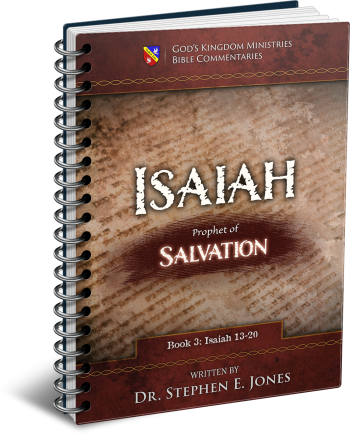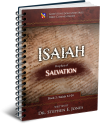Latest Posts
View the latest posts in an easy-to-read list format, with filtering options.

Isaiah is the prophet of Salvation. He is also known as the truly "Universalist" prophet, by which is meant that He makes it clear that salvation is extended equally to all nations and not just to Israel. He lived to see the fall of Israel and the deportation of the Israelites to Assyria, and he prophesied of their "return" to God (through repentance). He is truly a "major prophet" whose prophecies greatly influenced the Apostle Paul in the New Testament.
Category - Bible Commentaries

Isaiah 13:17, 18 says,
17 Behold, I am going to stir up the Medes against them, who will not value silver or take pleasure in gold. 18 And their bows will mow down the young men. They will not even have compassion on the fruit of the womb, nor will their eye pity children.
Here God revealed to the prophet that the Medes would conquer Babylon and judge them by their own merciless standard. Indeed, when Babylon fell in 537 B.C., it was Darius the Mede who took the throne temporarily (Dan. 5:31) until Cyrus the Persian came to rule the city personally. It was in the first year of Cyrus (Ezra 1:1) that he issued his decree allowing the people of Judah to return to the old land (534 B.C.).
As we will see later, the name of Cyrus was revealed in Isaiah 44:28 and again in 45:1. It seems, however, that Isaiah did not know that Cyrus was to be a Persian, since no mention of his nationality is recorded. Perhaps God’s silence made him assume that Cyrus would be a Mede. The prophet again mentions Media along with Elam in Isaiah 21:2.
At any rate, the prophet tells us that the Medes would not value silver or gold in that the Babylonians would not be able to bribe them or pay them to cease their siege, as was often done. Recall that Hezekiah gave gold and silver to the king of Assyria as a bribe so that the Assyrians would not lay siege to Jerusalem (2 Kings 18:14-16).
The Medes, however, understood the value of territory and the commercial value of cities, so they did not “take pleasure in gold.” They were also ruthless in battle, not sparing the children of those who opposed them in their desire for conquest.
Isaiah 13:19 says,
19 And Babylon, the beauty of kingdoms, the glory of the Chaldeans’ pride, will be as when God overthrew Sodom and Gomorrah.
Chaldea was a 400 x 100-mile territory in what is now southern Iraq. They were a highly educated people, known for their wisdom and knowledge of astrology. Hence, during the time of Daniel, Babylon was a famous intellectual center. However, Chaldean wisdom failed to interpret Nebuchadnezzar’s dream (Dan. 2:2, 10, 11), and it was only because of the revelation God gave to Daniel that the wise men (magi) were spared certain death (Dan. 2:12, 16, 19).
The Assyrians claimed to be the rulers of Babylonia as early as 728 B.C., but in 721, while they were laying siege to Samaria, a Chaldean named Merodach-Baladan II took the throne of Babylon and ruled it from 721-710 B.C. He managed to maintain Babylon’s independence for a decade before fleeing the city. The people of Babylon then capitulated to Sargon, the king of Assyria, ending its Chaldean rule. During the next century, Babylonia remained a province of the Assyrian empire until the Chaldean general Nabopolassar and his son Nebuchadnezzar revolted and overthrew Nineveh in 612 B.C.
The Assyrian forces moved to Harran but were decisively defeated there, and Babylon became the dominant empire for the next 70 years. The Chaldean kings ruled until Nabonidus (from Harran) took the throne in 554 B.C. He reigned until the fall of Babylon, although his son, Belshazzar, ruled the city as his co-regent until the actual fall of Babylon. We read in Dan. 5:30 that “Belshazzar the Chaldean king” was then killed. He was not actually a Chaldean by genealogy but was the king of Chaldea/Babylon.
Isaiah’s prophecies about Babylon were remarkable in that the prophet looked far beyond his current situation. He talked about Babylon’s fall even before Babylon had risen to its position as a world power. In the days of Isaiah, Assyria was conquering Babylon, but he prophesied that Babylon would overthrow Assyria and take its place on the stage of history. Still later, he said, Babylon too was to be overthrown by the Medes and by someone named Cyrus.
Cyrus (Hebrew: Koresh) means “possess the furnace.” His name was prophetic, because when he conquered Babylon it was like the overthrow of Sodom and Gomorrah. Both cities were overthrown by fire from heaven. So also, Babylon was thrown into the prophetic “furnace” i.e., by a man named Possess the Furnace.
Just as the overthrow of Sodom and Gomorrah was so thorough that the cities were never again inhabited, so also Babylon was to suffer the same fate. The difference is that Babylon was taken intact with little or no destruction. It was only later (during the Grecian empire) that the city became uninhabited. To this day, no one spends the night there.
After the death of Alexander the Great, his empire was divided among his four generals. Their constant fighting in the “Wars of the Diadochi” (322-281 B.C.) ultimately resulted in the evacuation of Babylon. One of the generals, Seleucus Nicator, took the city and then used its building materials to build a new capital, which he named “Seleucia on the Tigris.” A clay tablet dated 275 B.C. says that the inhabitants of the city were transported to Seleucia on the Tigris. So Babylon became uninhabited, as Isaiah prophesied in Isaiah 13:20,
20 It will never be inhabited or lived in from generation to generation; nor will the Arab pitch his tent there, nor will shepherds make their flocks lie down there.
Jeremiah 25:12 confirms this prophecy, saying,
12 “Then it will be when seventy years are completed I will punish the king of Babylon and that nation,” declares the Lord, “for their iniquity, and the land of the Chaldeans; and I will make it an everlasting desolation.”
Indeed, the place was later considered to be haunted. Arabs would not pitch their tents there, nor would anyone spend the night there. In recent years, Saddam Hussein attempted to rebuild the ruins with bricks carrying his name, but his overthrow in 2003 caused the project to fail.
Isaiah 13:21, 22 concludes,
21 But desert creatures will lie down there, and their houses will be full of owls; ostriches also will live there, and shaggy goats [satyrs] will frolic there. 22 Hyenas will howl in their fortified towers, and jackals in their luxurious palaces. Her fateful time also will soon come and her days will not be prolonged.
The prophecies about the original city of Babylon established the patterns for the rise and fall of Mystery Babylon in the book of Revelation. The overthrow of Mystery Babylon is depicted in Rev. 18:2, saying,
2 And he cried out with a mighty voice, saying, “Fallen, fallen is Babylon the great! She has become a dwelling place of demons and a prison of every unclean spirit, and a prison of every unclean and hateful bird.
This is how John interpreted the prophecy in Isaiah 13:21 and how he applied it to Mystery Babylon. Likewise, we read in Rev. 18:24,
24 And in her was found [exposed and made liable for] the blood of prophets and of saints and of all who have been slain on the earth.
Because Mystery Babylon was shown to be the final phase of the beast empires in Daniel 7, this world-wide “city” was held accountable for all the sins of its predecessors. Actually, John refers to Jesus’ earlier prophecy about Jerusalem in Matt. 23:34, 35, 36,
34 Therefore, behold, I am sending you prophets and wise men and scribes; some of them you will kill and crucify, and some of them you will scourge in your synagogues, and persecute from city to city, 35 so that upon you may fall the guilt of all the righteous blood shed on earth, from the blood of righteous Abel to the blood of Zechariah, the son of Berechiah, whom you murdered between the temple and the altar. 36 Truly I say to you, all these things will come upon this generation [or offspring].
Here we see how the earthly Jerusalem was essentially equated to Babylon (Rev. 11:8). Jesus attributed to Jerusalem the liability of all martyrdoms dating back to Cain who killed Abel. Abel, the first martyr, was a type of Christ in this manner. John’s revelation shows that in the end, the earthly Jerusalem is the prophetic successor to Sodom, Egypt, and Babylon—not God’s Kingdom. The city’s liability will become apparent to all, and this will justify God’s verdict against the city.
It is apparent, then, that Jerusalem, like Babylon, will become uninhabited at some point. This is apparent in Jer. 19:10, 11 and also (as we will see later) in Isaiah 29:1-10, where the prophet refers to Jerusalem by its poetic name, Ariel. Ariel has a double meaning. It was supposed to be the “Lion of God,” but instead it became “God’s hearth” (fireplace, furnace).